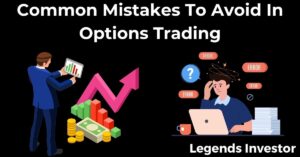Introduction: Navigating the Common Pitfalls in Trading
Trading can be a highly rewarding endeavor, but it’s fraught with potential pitfalls that can lead to significant financial losses and psychological stress. Avoiding common trading mistakes is crucial for maximizing profits and minimizing losses. Understanding these errors and learning from them can help you navigate the complexities of the market more effectively.
In this article, we’ll explore some of the most frequent mistakes traders make and provide insights on how to avoid them. We’ll cover the importance of having a trading plan, managing risk, staying adaptable, controlling emotions, timing trades, preventing overtrading, and considering tax implications.
Lack of a Trading Plan: Trading by Instinct Alone
The Necessity of Having a Detailed Trading Plan
A trading plan is a comprehensive framework that outlines your trading strategy, risk management, and trading goals. Without a plan, you’re likely to trade impulsively, relying on instincts rather than a structured approach. This can lead to erratic trading behavior and inconsistent results.
How Trading Without a Plan Can Lead to Inconsistent and Impulsive Decisions
When you trade without a plan, decisions are often driven by emotions or short-term market movements rather than a well-considered strategy. This can result in:
- Inconsistent Results: Without a clear strategy, your trades may lack coherence and lead to unpredictable outcomes.
- Emotional Decisions: Trading based on gut feelings or recent market moves can lead to poor decision-making.
Tips on Creating a Robust Trading Plan That Aligns with Investment Goals
- Define Your Goals: Determine what you want to achieve with your trading, whether it’s capital growth, income generation, or diversification.
- Choose Your Market: Decide which markets and assets you’ll trade based on your goals and risk tolerance.
- Develop a Strategy: Outline your approach to analyzing the market and making trade decisions.
- Implement Risk Management: Include rules for managing risk, such as setting stop-loss orders and defining position sizes.
- Establish a Routine: Create a daily routine for market analysis, trade execution, and review.
Overlooking Risk Management: The Cost of Negligence
Understanding Risk Management and Its Role in Successful Trading
Risk management is essential for protecting your capital and ensuring long-term trading success. It involves implementing strategies to limit potential losses and manage the risk associated with each trade.
Common Risk Management Oversights, Such as Not Setting Stop-Loss Orders
Common mistakes in risk management include:
- Neglecting Stop-Loss Orders: Failing to set stop-loss orders can lead to significant losses if the market moves against you.
- Overleveraging: Using excessive leverage increases the risk of large losses.
Strategies for Implementing Effective Risk Management Measures
- Set Stop-Loss Orders: Establish stop-loss levels to automatically exit trades at a predefined loss amount.
- Determine Position Size: Calculate the appropriate position size based on your risk tolerance and account size.
- Diversify Your Portfolio: Spread your investments across different assets to reduce overall risk.
Failing to Adapt: The Dangers of a Rigid Approach
The Importance of Flexibility and Adaptability in Market Conditions
Markets are dynamic, and a rigid approach can lead to missed opportunities or substantial losses. Adapting to changing market conditions is crucial for successful trading.
Case Studies of Losses Incurred Due to Inflexibility
- Example 1: A trader who strictly followed a technical indicator without considering broader market trends may have suffered significant losses during a major news event.
- Example 2: An investor who adhered to a long-term strategy despite a severe market downturn might have faced excessive losses due to an inability to adjust their approach.
How to Remain Adaptable Without Compromising Your Trading Plan
- Monitor Market Conditions: Regularly review market trends and news to assess whether adjustments to your strategy are needed.
- Be Open to Changes: Allow flexibility in your plan to accommodate new information and evolving market conditions.
- Review and Update: Periodically review and update your trading plan to reflect changes in the market and your personal circumstances.
Letting Emotions Dictate Decisions: The Psychology of Trading
Impact of Fear and Greed on Trading Decisions
Emotions like fear and greed can heavily influence trading decisions, often leading to suboptimal outcomes:
- Fear: May cause you to exit trades prematurely or avoid opportunities.
- Greed: Can lead to overtrading or taking excessive risks in pursuit of higher returns.
Techniques for Managing Emotions and Maintaining Objectivity
- Develop a Trading Plan: A well-defined plan helps you stick to your strategy and avoid emotional decision-making.
- Use a Trading Journal: Document your trades and emotions to identify patterns and triggers.
- Practice Mindfulness: Techniques like meditation and stress management can help maintain emotional balance.
The Role of Behavioral Finance in Understanding Trading Mistakes
Behavioral finance explores how psychological factors influence trading decisions. By understanding these factors, you can develop strategies to mitigate their impact, such as setting clear rules and maintaining a disciplined approach.
Poor Timing: When Patience Pays Off
The Significance of Entry and Exit Timing in Trading
Timing is crucial in trading; entering or exiting a trade at the right moment can significantly impact your profitability. Poor timing can lead to missed opportunities or losses.
Consequences of Impatience and Premature Actions
- Premature Exit: Selling a position too early can result in missed gains.
- Late Entry: Waiting too long to enter a trade can lead to missed opportunities and reduced profitability.
Tools and Indicators That Can Help Improve Trade Timing
- Technical Indicators: Use tools like moving averages, Relative Strength Index (RSI), and Bollinger Bands to identify optimal entry and exit points.
- Economic Calendars: Monitor economic events and news releases that can impact market movements.
- Backtesting: Test your strategies using historical data to refine your timing and improve decision-making.
Overtrading: The Lure of the Market’s Siren Song
How Excessive Trading Can Erode Your Capital Through Fees and Poor Decision-Making
Overtrading can erode your capital due to:
- High Transaction Costs: Frequent trading can lead to increased fees and commissions.
- Poor Decision-Making: Trading too often can result in impulsive decisions and increased risk exposure.
Identifying the Signs of Overtrading
- Frequent Trades: Regularly executing trades without clear signals or strategies.
- High Transaction Costs: Noticing a significant amount spent on trading fees.
- Emotional Trading: Trading driven by emotions rather than a structured plan.
Establishing Limits to Guard Against the Temptation to Overtrade
- Set Trading Limits: Define a maximum number of trades per day or week.
- Use a Trading Plan: Adhere to your plan’s criteria for trade execution to prevent impulsive trading.
- Review Performance: Regularly review your trading activity to ensure adherence to your limits.
Ignoring Tax Implications: A Hidden Threat to Profits
The Importance of Understanding the Tax Consequences of Trading
Ignoring tax implications can impact your net gains and overall profitability. Understanding how taxes affect your trading profits is crucial for effective financial planning.
Examples of How Not Planning for Taxes Can Impact Net Gains
- Capital Gains Tax: Failing to account for capital gains taxes can reduce your overall profits.
- Tax Reporting: Not keeping accurate records can lead to complications during tax season.
Advice for Incorporating Tax Considerations into Trading Strategies
- Consult a Tax Professional: Seek advice from a tax professional to understand the tax implications of your trades.
- Maintain Records: Keep detailed records of all trades, including dates, amounts, and gains or losses.
- Plan for Taxes: Factor tax implications into your trading strategy and financial planning.
Conclusion: Turning Mistakes into Lessons
Avoiding common trading mistakes is essential for achieving trading success. By learning from errors and implementing strategies to mitigate them, you can enhance your trading skills and improve your financial outcomes.
Recapitulation of the Key Trading Mistakes to Avoid
- Lack of a Trading Plan
- Overlooking Risk Management
- Failing to Adapt
- Letting Emotions Dictate Decisions
- Poor Timing
- Overtrading
- Ignoring Tax Implications
The Significance of Learning from Each Misstep to Become a Better Trader
Every trading mistake is an opportunity for growth and improvement. By analyzing and learning from your errors, you can refine your strategies and enhance your trading skills.
Encouragement to Pursue Continuous Education and Improvement in Trading
Trading is a dynamic field that requires ongoing learning and adaptation. Stay informed about market developments, continuously evaluate your strategies, and seek opportunities for education and improvement. By doing so, you’ll be better equipped to navigate the complexities of trading and achieve long-term success.



